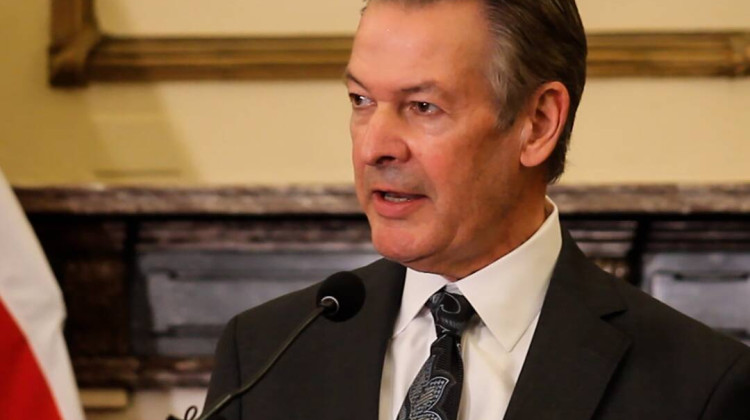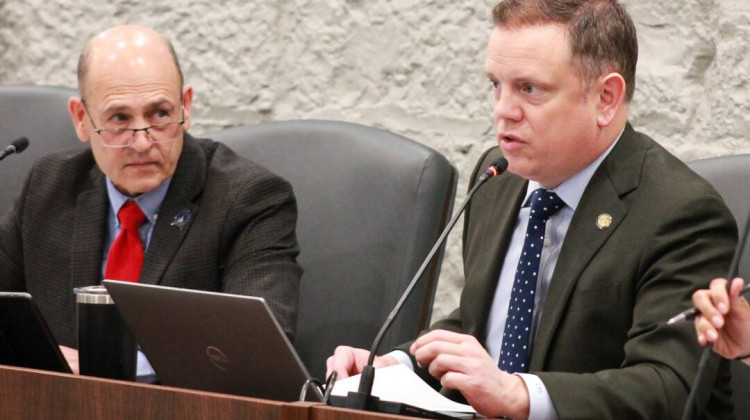
Books at the Joyce Winner West Branch of Carmel Clay Public Library in April 2023.
Eric Weddle / WFYIIndiana Republican lawmakers introduced a bill that would drastically change the way public libraries are funded and limit the types of events and activities they can host. The legislation could also potentially result in decreased funding for library services.
Senate Bill 32, authored by Sens. Jim Tomes (R-Wadesville) and Gary Byrne (R-Byrneville), would eliminate the ability for public libraries to impose property taxes. Instead, libraries would need to submit their budgets for approval to their local city or county government, in the same way that other municipal departments do.
The proposal comes months after legislation that makes it easier for community members to request removals of books from schools was signed into law. And libraries across the country have come under fire in recent years for hosting events like drag queen story hours, or for including books in their young adult collections that some people find objectionable.
Tomes told WFYI that he believes some libraries make inappropriate content available to children. But he said the library funding legislation isn’t motivated by those concerns.
“It was just the fact that we have an entity that can tax people, and they don't have to answer directly to the people. That's not the way government should work.”
But Diane Rogers, president of the Indiana Library Federation, said the bill would negatively impact libraries and their patrons. The federation opposes the legislation.
“This gives up a lot of autonomy for public libraries and allows counties to choose to potentially not fund a public library at all,” Rogers wrote in an email.
Libraries in Indiana are primarily funded through property tax dollars, according to Rogers. She wrote that these taxes usually make up more than half of a public library’s budget; the remainder of their budget comes from other tax sources, including local income taxes, vehicle excise taxes or financial institution taxes.
The proposed legislation would also restrict libraries to a set of “core functions,” that are limited to public access to library materials, quiet areas for study, technical assistance, and acquisition of services for members of the public.
But public libraries typically offer a much wider array of services, including early literacy programs, science, technology, education and math programs, as well as dedicated makerspace labs, community programming like author talks, music performances and art exhibits.
Increasingly, libraries have also begun to offer social work services to help patrons gain access to government assistance, housing and mental health services.
Senate Bill 32 would prohibit libraries from offering these services and activities unless they include them in their annual budgets and receive approval from their local county or city government.
In a statement, the Indiana Library Federation said the bill doesn’t take into account modern ways of how public libraries operate as community hubs.
“Not providing library patrons with these services would directly affect public libraries from meeting Indiana State Library compliance standards,” the statement reads.
Tomes said he authored the legislation because he believes libraries aren’t accountable to residents for the taxes they levy.
“So the bill simply says this, okay, libraries, you submit your budget to an elected body of officials, right, city council — they're the ones that determine, okay, yeah, here you go, here's your money, or not quite as much,” Tomes said during an interview with WFYI.
Tomes said he’s concerned about libraries with budget surpluses that continue to tax residents.
“We're not going to have an entity, a government — I don't know who would approve of this, and how it even got started, that doesn't have any responsibility to answer up for what they do with taxing,” he said.
But public libraries are accountable to their boards, and members of these boards are appointed by local elected officials. Library boards approve annual budgets, and they host public meetings and hearings on those budgets. Library budgets are publicly available, and they’re also submitted to the state’s Department of Local Government Finance and the State Board of Accounts for review. Rogers said libraries are also routinely audited by the state.
If passed, the bill would result in an increased administrator workload for municipal and county governments — which would have to take on the duties of budget oversight and approval for libraries, according to the nonpartisan Legislative Services Agency.
The LSA’s fiscal note also states that the bill could lead to spending reductions for public libraries. But the actual impact would vary from library to library based on whether a city or county government would approve funding for services that are outside the definition of “core functions.”
The bill was referred to the Senate Tax and Fiscal Policy Committee.
Contact WFYI education reporter Lee V. Gaines at lgaines@wfyi.org.
 DONATE
DONATE








 Support WFYI. We can't do it without you.
Support WFYI. We can't do it without you.